Be the rabbit!
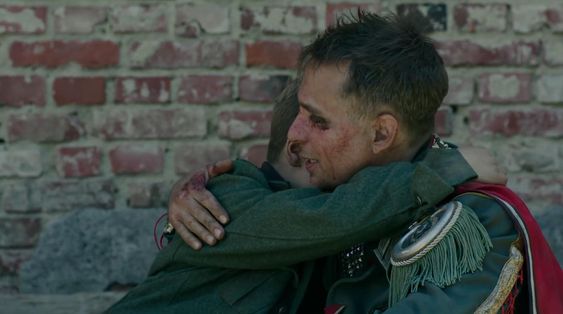
Be the rabbit. The humble bunny can outwit all of his enemies. He’s brave, and sneaky, and strong. Be the rabbit! However crazy this is gonna sound, I actually consider this a good advice. Considering the man who gave it to 10-year-old Jojo, it might seem controversial. But Jojo Rabbit is one step more than controversial – it’s inspiring and heartwarming story of love in different shape and sizes.
Jojo Betzler. Ten years-old. Today, you join the ranks of the Jungvolk, in a very special training weekend. It’s going to be intense. Today, you become a man.
What starts as a comedy, later on progresses to bitter-sweet story full with heartbreaks, tears and loneliness. But before I dig into that, let’s draw some background here. In March 2018 Taika Waititi announced that he will direct, write, co-produce and co-star in the film, as an imaginary Adolf Hitler. The second I heard about it, somewhere in 2019 I just smiled. It’s Taika after all.

His creative journey is one of the best rides you can jump into, in movie industry. What we do in the shadows (or, as I like to call it: Keeping up with the Vampires), Hunt for the Wilderpeople, Boy, Thor: Ragnarök… Lots of wonderful short films that gave a spin to his career and upcoming projects like Star Wars film – all of that combined gave me sense of serenity and calmness, that “Hitler movie” will be a good one. But what is good? Maybe I should use some other word, like “interesting”.
Ever since Thor: Ragnarök I kept my eye on Taika (pun intended, he is listed here, right?) but only recently started catching up with his work, including his lock down action – reading James and the giant peach by Roald Dalh, with some of his friends. And let me tell you – this is the ultimate highlight of this COVID situation.
I watched a lot of interviews with Taika about developing Jojo Rabbit and even though this film based on a book Caging skies by Christine Leunens, it has Waititi’s signature twist. He had to convince and trick a lot of producers to get money for this crazy project. But in Taika’s dictionary, there is no such thing as crazy – there is creative. And I love creative. I mean, that other way to show absolute horror of war, if not in a creative, imaginary way?
Adolf, I don’t think I can do this.
What? Of course you can. Sure, you’re a little bit scrawny, and a bit unpopular, and you can’t tie your shoelaces, even though you’re ten years-old.
From the beginning, Jojo tries to be confident and tough but it is just a façade – after all he is 10 and still a child. Kid, that needs his mother’s love, a hug from his best friend and a father-figure to look up to (luckily, his role model has changed throughout the course of the movie). Times were rough and instead of going for propaganda-camps, he should be playing around, safely with Yorkie and fellow children.
But it seems like everyone around Jojo want to be a Nazi. So, he fixates himself over the idea of becoming a man for his family – and the only way to achieve that is to join Hitler’s personal guard.

I watched this movie again, this time with my mum and she is the toughest film critic out there. Witnessing “kids-friendly” Nazi propaganda in a goofy way is challenging. That’s why I kept telling her that it is a bitter-sweet movie – through first half you are laughing and during second half you feel guilty for that. But you shouldn’t – it was all part of Taika’s master plan. Roller coaster of emotions, going from slight shade of sympathy for the devil, adoration for Jojo’s attempts to be tough but still a little boy at heart, thrill of discovering the shocking secret and pain of the consequences…
Don’t make me run, kid. I’m far too hungry, and you know how much we love the taste of blood.
Storytelling is a wonderful art. Very hard to master, but so damn beautiful when you being to unravel its secret ways. There is one element that I especially like, called The Catalyst. In shorter words, it’s something that happens to the hero – and she/he can’t go back from it. In Jojo Rabbit the catalyst is spectacular: he discovers that his mother is hiding a Jew – mortal enemy – in the walls of his sister’s bedroom. This shakes Jojo’s world to the ground. He thought that his mother is a model German citizen, in loyal duty to the Reich. But there is no time to delve into that. Suspicion and investigation will come later.
Because right after Catalyst, there is a time for The Debate. Jojo deliberates with his imaginary friend Hitler what should he do know – and as usual, they have different points of view:
Adolf: Oh, what to do. What to do.
Jojo, Adolf: Got it!
[together]
Jojo: I’ll negotiate.
Adolf: Let’s burn down the house and blame Winston Churchill.
[pause]
Adolf: Or negotiate.
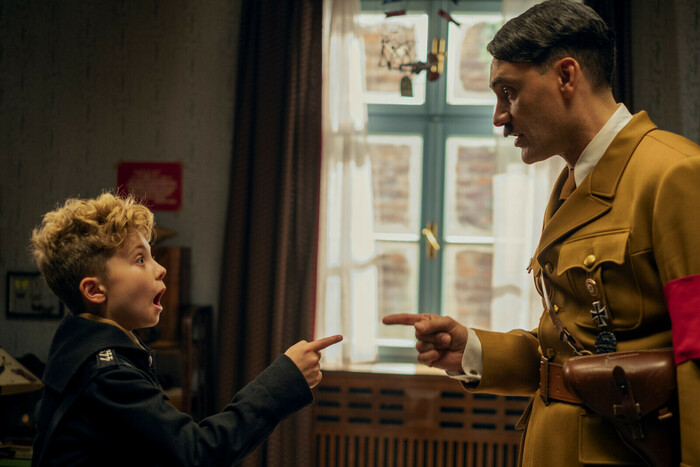
Source: kinonh.pl
Eventually, Jojo decides to use this dangerous situation to his advantage – he wants to create a book for Hitler himself, all things to know about Jews.
Using those two elements in books and movies is common trick, but not often used correctly – making more harm to the plot. Waititi is a master-storyteller and he built something amazing and truly engaging for the audience.
Thanks to the powerful catalyst, Jojo is going through classic-but-not-so-classic transformation – from a little boy who wants to be a Nazi to considerate and kind little man, who choses to protect instead of give up.
So, it’s a Mexican stalemate.
Just a normal stalemate.
Evolution of Jojo and Elsa’s relationship is wonderful – simple, but simply beautiful. And believe me, there is nothing wrong with simple, especially when entire movie is somewhat twisted. Initial aggression, driven by ridiculous propaganda slowly transforms into deeper connection.
It’s fun to watch how Elsa is playing with Jojo and messing with his head, gently (or not) tackling grounds of his German-mind. He learns that what they taught him about Jews is not true – horns, mind tricks, sleeping like the bats… This truly comes as a shocker to young fanatic, that Jojo thinks he is. Besides discovering the “truth”, he also starts seeing Elsa as… A girl. And that happens in the cutest way possible, he pretends to be her fiancé Nathan, a resistance soldier. Jojo starts writing letters, firstly to “break up” with Elsa, but seeing how sad she is after hearing the news, he decides to carry on with more romantic note.

The cutest letter was the one straight from his heart – staring at a blank sheet of paper, saying that he and Nathan came up with escape plan for Elsa, so she can join him in Paris. Creativity and dedication of that little rabbit!
I’m being made to teach the HJ boys water warfare training. You know, in case they ever need to go to battle in a swimming pool.
Sam Rockwell plays Captain Klenzendorf (K for short) and let me share this thought with you – at first, he just seems like he doesn’t care about anything. The kids at camp, the war… He seems like his own man, designing fancy uniform and dealing with degradation. But knowing how the movie ends, you can see the subtle hints that Captain K is a good man. Sure, we don’t know much about his past. But his actions – taking care of Jojo after the hand grenade accident, always being nice to him (with a sweet dose of sarcasm of course), letting Jojo steal the crayons, showing up during the Gestapo search at Jojo’s house…
This scene was funny (heil-ing), terrifying (Jojo was alone and covering up for his mother), painful (Elsa didn’t hide and was forced to heil everyone) and heartwarming (Captain K saving Jojo and Elsa, going along with the lie). Easily, one of the most intense acts.
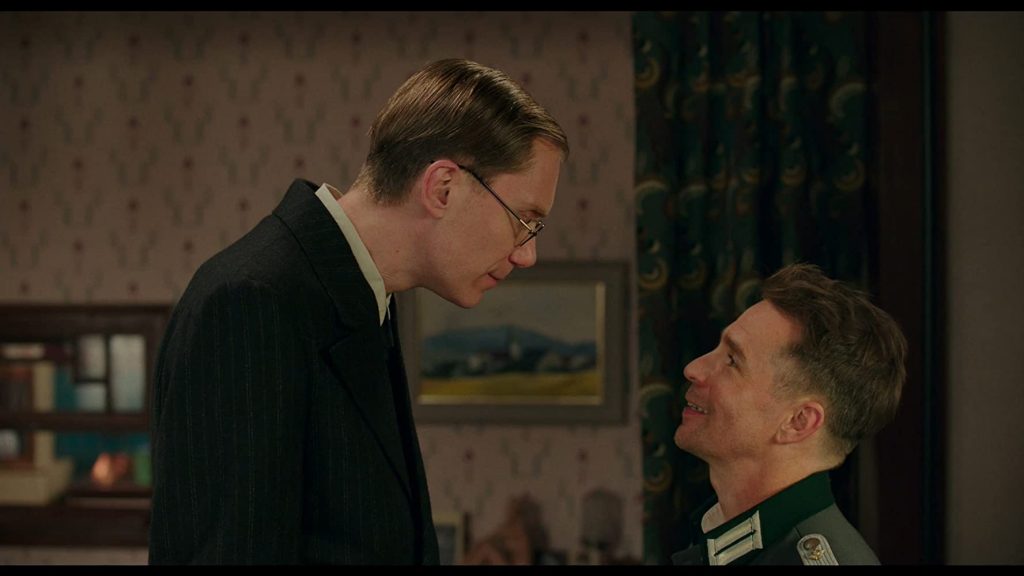
Taika and Steven “broke down” this scene here.
Final scene with Captain K broke my heart. Jojo, scared little rabbit survived thanks to his kindness and good heart. In the end, he became the father-figure Jojo was looking for. The moment thy shared, the hug… Pure and beautiful.
Now, we’re going to pluck up your courage, walk out that door, and have an incredible adventure. Okay?
Another strong “supporting” performance and creation Twin Peaks Café award goes to Scarlett Johansson. She played Rosie – Jojo’s mother. And all she ever wanted for her son was to enjoy childhood, even though the circumstances of war were tragic. Rosie wanted to teach her son about life and its consequences. They share those little moments, like talking by the river bank and riding bikes.
Jojo: Everyone. Anyway, it’s a stupid idea.
Rosie: You’re stupid. Love is the strongest thing in the world.
Jojo: I think you’ll find that metal is the strongest thing in the world, followed closely by dynamite, and then muscles. Besides, I wouldn’t even know it if I saw it.
Rosie: Surprise, surprise, your shoelaces are undone again.
[Rosie goes over to tie up his shoelaces]
Rosie: Oh, Jojo, you know when it happens. You feel it, it’s a pain.
Jojo: In my heart, I bet.
Rosie: In your tummy, like you’re full of butterflies.
Jojo: Yuk.
Rosie: Yeah, yuk. Come on. Get a move on.
One of the most powerful scenes, and yet another beautiful parallel – scene on market place, where executed men and women are hanged on display. She makes Jojo watch, and when he asks what did they do, her answer is painful to the bone: what they could.
And that’s what she tried too. When Jojo follows the butterfly – a feeling his mom told him about, we can see his smile, until he looks up and sees his mother’s shoes. With untied shoelaces… In that moment, he is no young soldier-wannabe. He is a little son, who’s beloved mum was taken away, for doing what she could.
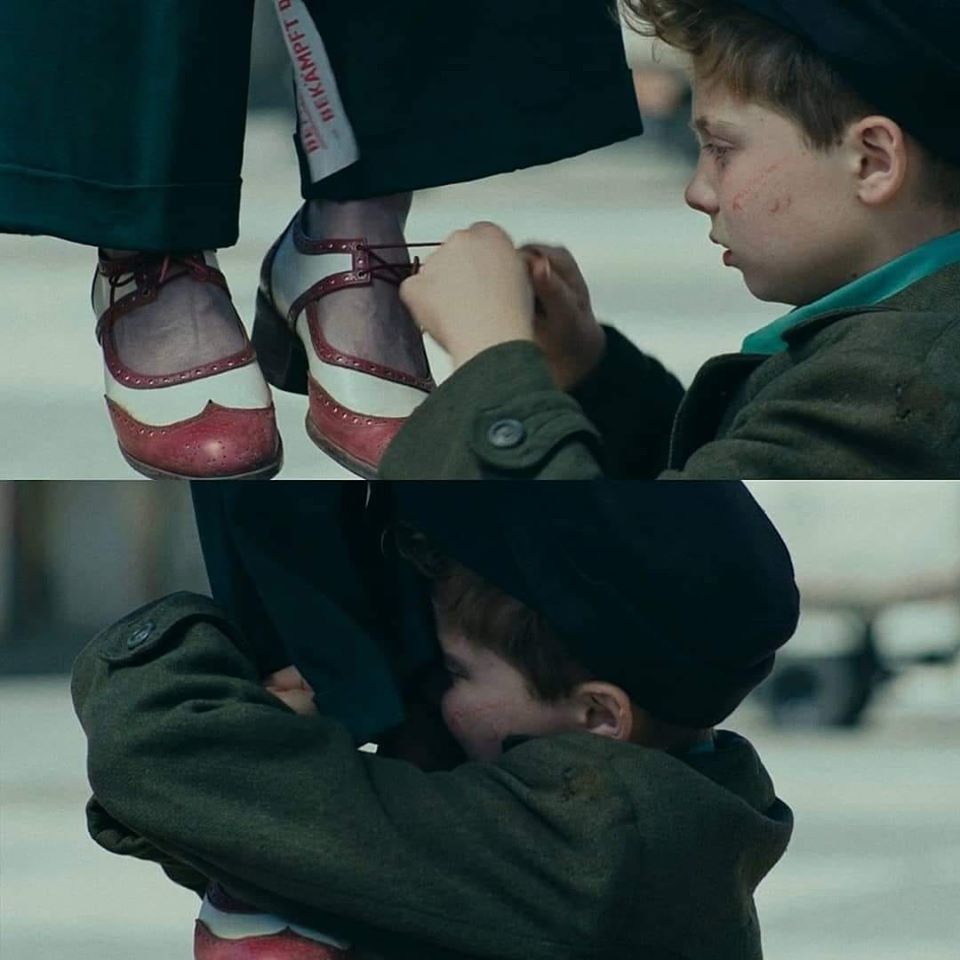
Also, that scene where she tried to enjoy good news, that war is coming to an end, but Jojo acted suspicious and under influence of imaginary Hitler, she loses it for a moment. Rosie puts on her husband’s coat, makes fake beard with coal and talks with her son. This conversation shakes both of them, at the same time bringing them closer together, as family.
You look a tiger in the eye. And trust without fear. That’s what it is to be a woman.
Rosie’s relationship with Elsa was something of a mother-daughter bond. She saved the girl, because it was the right thing to do, but also because she resembled her late daughter, Inge. There wasn’t much Rosie could do for Elsa, but on the other hand, she’s done plenty. Each time Elsa doubted that there will be hope or light in her life, Rosie tried to cheer her up. I think her ultimate dream was for Jojo and Elsa to get along, be like brother and sister.
What I really liked was the motive of dance in this film – as the ultimate form of freedom. Jojo thinks, that dancing is for people who don’t have a job – a “luxury” and privilege of people who have no purpose. Rosie tells him, that it is a sign of gratitude and form of celebration. For Elsa, that’s freedom.
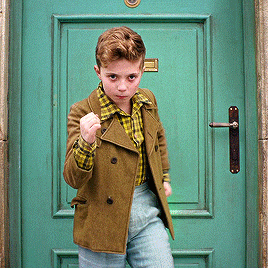
For me, the dancing had one more “function” – it was a beacon of hope. War was over and Germany lost. People could come out of their houses and celebrate. And what better song to use, than David Bowie’s Heroes, obviously in German!
Jojo! Oh, I’ve missed you. I’m sorry about your mama. I cried for ages when I heard what happened.
Internet fell in love with this chubby, adorable kid Yorki – Jojo’s one true friend. And even though they are so very young, what they have is marvelous. They both were lost boys, trying to go with the “flow” of being a Nazi. When their war started – not the one already existing, but the one they had to fight in – it showed exactly how stupid, pointless and brutal war is. And how ruthless they were, to send children to settle their business. Taika’s vision was bold but very much like him.
What was also beautiful in Jojo and Yorki friendship was lack of jealousy. Jojo’s accident ended his dream of becoming top man in Hitler’s personal guard. Yorki got what they trained for – he became a soldier at age of 11. And even though Jojo was disappointed that his life turned out this way, he was happy for Yorki.

Friendship motive was very strong in Jojo Rabbit – beside the boys, beautiful friendship/sibling relationship grew between Jojo and Elsa. In my opinion, there was also a spark of understanding and respect between Rosie and Captain K. He was in awe of her, even though she blamed him for Jojo’s accident. Friendship is positive point, a fundament that can overpower all the bad things in the world. It makes life easier and it’s always better to deal with every crisis and trouble with someone kind by your side.
My empire will be full of all animals, lions, giraffes, zebras, rhinoceroses, octopuses, rhineoctopuses, even the mighty rabbit.
I mentioned before, that Taika had to trick a lot of people into making this film – including his wife (still, because apparently, they have been separated for two years now). The idea of adapting Caging skies into a movie was okay, but in the book, there is no imaginary Hitler friend. And, as he mentioned couple of times in interviews, he didn’t want to cast someone famous, beautiful and handsome (uhhh, Taika…) as Hitler. He never intended to make a star out of him, just a secondary character that at first, shows the friendly face. As the movie progresses, he turns from supportive friend into a tyrannical asshole, who is afraid of losing his power over Jojo.
Taika’s performance as Hitler was outstanding. He said that he did zero research on Hitler, because he didn’t deserve any special preparation. Yet, he gave us unforgettable image of a maniac, who though that there is one superior nation – one above everyone else.
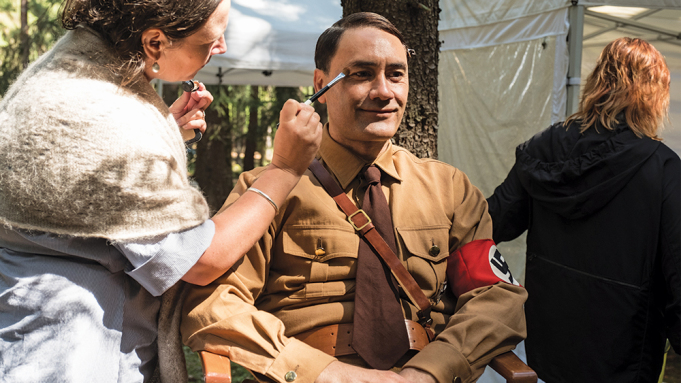
Waititi created amusing Nazi-mocking satire and among many prizes he received, there is the most important one – fan’s appreciation. Audience around the world was amazed by the genius, creativity and simplicity of the message – hate is going to be your doom. I remember, that it was a “hot shot” during American Film Festival in November. Tickets for his movie were sold out in the matters of minutes and sadly, I didn’t get them.
Also – imagine Taika dressed up, full costume with moustache and doing director’s work behind the camera, giving pointers to Roman, Scarlett or Sam. Both terrifying and hilarious.
Let everything happen to you. Beauty and terror. Just keep going. No feeling is final.
By now, I’ve seen this film 4 times, and I will watch it again sometime soon. To the point, it’s a lesson for Jojo to learn – what it truly means to be a man. How to recognize what’s good and bad. Standing up in the name of greater cause and exposing the truth shielded by fairy-tale propaganda.
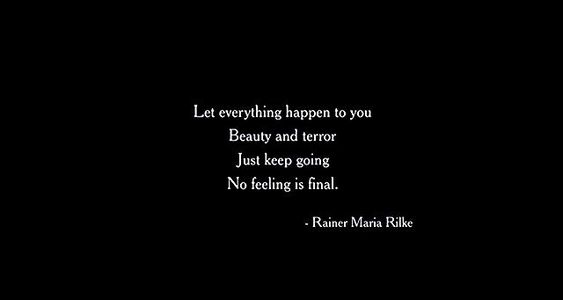
For sure, Taika Waititi with a bang entered red carpets in the movie industry, with bold interpretation of important book. Besides the world’s appreciation, just recently, actor and director was made an officer of the New Zealand Order of Merit for services to film.
If you are still wondering whether or not to watch this film – stop and watch it. It’s influential and significant, with wise message and wonderful aesthetics.
Wow. This is great review, your insights are amazing. Thank you. Sunday is always better with you.
Aaaaaand now I want to watch this movie again.
I remember the mixed feelings I had before we went to see this movie for the first time. I admire Taika’s attitude towards cinematography but I wasn’t sure if his approach to this topic will be a right one. Oh, how wrong I was. I even remember that I heard two guys talking about this movie as I was waiting for some other movie to start and they claimed that they were not sure if they wanted to see it because it seems like a silly comedy. Well, I just hope they did go after all and that it proved them wrong.
This is a very weird type of movie – the one which you can’t easily wrap your mind around because it both makes you laugh your ass off and then straight away breaks your heart. I like how you said that you kind of regret laughing in a matter of minutes. That is absolutely true, but at the same time I think it was Taika’s intention to show such a huge contrast and sudden change of tone that you don’t feel at ease with the first part. After all the moral is clear – war is stupid and being a Nazi is even more stupid. Doesn’t he prove his point with the technique he used? I think he does.
You said so much about this movie that there is not much to add here. One thing that absolutely stole my heart is Waititi’s aesthetics. The way he puts attention throughout the movie to Jojo’s mom’s shoes so that we remember them well and understand what happened immediately; the colours – some scenes look like taken straight from a painting (I remember this one scene which is a shot of a wall, I think with a window, and a chair next to it, or something like this – it was so beautiful!). The journey of the main character who has to grow up withing weeks and starts understanding that life is not only about things being black or white but that there are so many shades of grey in between. The friendship between Jojo and Yorkie which finds them in the most unexpected moments. All images so powerful and straightforward.
Ah, and of course the actor’s craftsmanship – starting from two wonderful young gentlemen, Roman and Archie, through Sam Rockwell, Scarlett Johansson and ending with Taika himself, amazing. I only found Thomasin McKenzie a bit bland but maybe this was the director’s vision?
I am super glad that you decided to put this review here today because it reminded me of how I loved this movie. You absolutely have this gift of finding the right words to describe things. Great job, absolute pleasure to read!